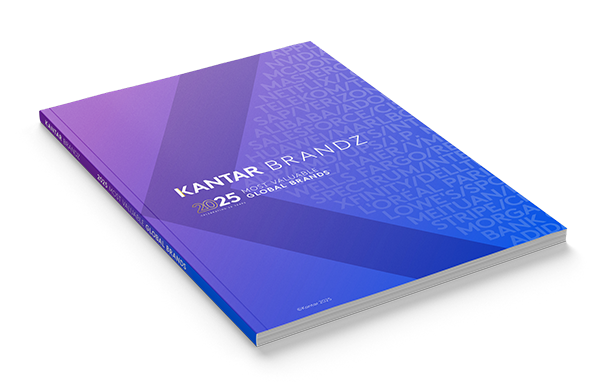Trust is a tricky concept for marketers. It’s closely associated with long-term growth, but doesn’t lend itself to a one-size-fits-all playbook. If the business needs to increase perceptions of trust, what should it do?
Trust arises when companies consistently meet customer expectations, ensuring that products and services perform as promised. But it also arises from something deeper: from a sense that a brand genuinely cares about consumers’ needs, and that it will support them when challenges occur.
Kantar BrandZ research has shown that over the past decade, companies with high trust indices grew 115% more than those with low indices. When customers believe they are genuinely cared for, they are more likely to remain loyal and recommend the brand to others. This ultimately contributes to sustained brand value growth.
At its most fundamental level, trust is built on reliably delivering the basics. This means clear communication, managing expectations and resolving issues without creating further complications. In our increasingly digital world, technology can play a critical role.
Back in 2008, Domino’s Pizza pioneered tracking technology where customers could monitor their orders from purchase to delivery. This was a novel proposition in the years before Uber’s rise. Domino’s innovation transformed a simple pizza delivery into a demonstration of reliability and expectations management, while also creating moments of heightened anticipation.
Yet not all technological deployments are created equal. A poorly designed chatbot or a clumsy self-checkout can frustrate customers rather than help them. Brands need to ensure that their innovative new tools genuinely enhance the customer experience. That means continually monitoring and improving their effectiveness. In an era where negative reviews and social media outcry can spread like wildfire, brands cannot be slow to fix problems.
Major public events can shake the foundations of trust. Alaska Airlines experienced a notable dip in customer perception after a door blew off one if its Boeing 737 Max planes mid-flight. According to Kantar BrandDynamics, our daily tracker of brand perceptions, negative buzz for Alaska Airlines spiked from 1.6% to 11% following this incident. The brand also experienced short-term declines in trust and brand consideration.
At the same time, Alaska Airlines always retained its strong reputation for customer service, as evidenced by consistently high Net Promoter Scores. And this ultimately allowed the brand to quickly recover from the door incident. The lesson? While external events may shake consumer confidence, a strong customer experience can help a brand ride out the swells and temporary setbacks.
Trust becomes a driver of advocacy and growth when a brand consistently delivers on its promises and remains authentic to its values.
Take Suzuki, for example. Its strategy is built on the personal touch, on genuine human interactions in its dealerships. Suzuki wants every customer to feel valued through these interactions. The evidence shows that the brand is succeeding. Since January 2019, Suzuki has been rated the top car brand for customer experience in the UK on multiple occasions by the Institute for Customer Service. In 2023. it received the Gold award for ‘Trusted Quality Provider’ at the UK Customer Satisfaction Awards.
Throughout this effort, Kantar has provided Suzuki with the technology and insights to monitor customer feedback. In 2025, Suzuki with its Kantar-powered CX programme was awarded Best Feedback Strategy by the Institute of Customer Service. In the hands of both dealerships and leadership, these tools have driven new improvements and innovations in customer service. The proof is in the high recommendation scores: 87% of Suzuki’s customers rate their experience at either nine or 10 out of 10 when asked if they’d recommend the brand.
Trust can be a powerful differentiator in competitive sectors like banking. In this category, the belief that a bank cares for its customers contributes around 25% to overall brand predisposition.
Nationwide, one of the UK’s leading retail banks, epitomises this. According to BrandDynamics, Nationwide has ranked first in ‘truly caring for its customers’ for the past three years. And it has remained the UK’s most trusted bank since September 2024.
Despite facing stiff competition from nimble fintech startups and well-resourced traditional banks, Nationwide has carved out a distinct niche for itself. It has done this by finding innovative ways to emphasise its mutual heritage and customer service.
In 2023, for example, it launched Fairer Share payments, an annual event that sees Nationwide redistribute a share of profits back to its members. Shortly after, the bank launched a campaign emphasising its dedication to keeping branches open until at least 2028. These efforts yielded tangible results, demonstrating very clearly what makes it different. Nationwide has retained the top spot in Pricing Power among UK retail banks since October 2023. This speaks to Nationwide customers’ willingness to pay a premium, or accept less attractive rates and benefits, in order to stick with the bank.
Since June 2023, Nationwide’s base of customers holding both current accounts and a savings or mortgage product has grown by around half a million. It’s a feat that underscores how emotional trust can serve as a differentiator that drives tangible business results. In Q4 2024, Nationwide recorded the highest net gains in current account switching of all retail banks in the UK.
For companies looking to build long-term brand growth through customer experience, managing trust is not optional, it’s essential, but trust is hard-won and easily lost. Consumer loyalties are perpetually in flux and reputation can be as fleeting as a social media post. To build enduring trust, a brand must cultivate consumer centricity in every facet of its business, from fine-tuning the nuances of customer service interactions to effectively deploying technology, the human touch builds trust. By consistently delivering on promises and fostering an emotional connection with customers, brands can differentiate themselves in crowded markets and achieve sustained business success.
Discover more brand-building inspiration in the 20th anniversary edition of Kantar BrandZ’s Most Valuable Global Brands rankings and report now available at www.kantar.com/campaigns/brandz/global
For a quick read on a brand’s performance compared to competitors in a specific category, Kantar’s free interactive tool, BrandSnapshot powered by BrandZ, provides intelligence on 15,000 brands. Find out more here.
Trust arises when companies consistently meet customer expectations, ensuring that products and services perform as promised. But it also arises from something deeper: from a sense that a brand genuinely cares about consumers’ needs, and that it will support them when challenges occur.
Kantar BrandZ research has shown that over the past decade, companies with high trust indices grew 115% more than those with low indices. When customers believe they are genuinely cared for, they are more likely to remain loyal and recommend the brand to others. This ultimately contributes to sustained brand value growth.
Trust as a foundation: reassurance of reliability
At its most fundamental level, trust is built on reliably delivering the basics. This means clear communication, managing expectations and resolving issues without creating further complications. In our increasingly digital world, technology can play a critical role. Back in 2008, Domino’s Pizza pioneered tracking technology where customers could monitor their orders from purchase to delivery. This was a novel proposition in the years before Uber’s rise. Domino’s innovation transformed a simple pizza delivery into a demonstration of reliability and expectations management, while also creating moments of heightened anticipation.
Yet not all technological deployments are created equal. A poorly designed chatbot or a clumsy self-checkout can frustrate customers rather than help them. Brands need to ensure that their innovative new tools genuinely enhance the customer experience. That means continually monitoring and improving their effectiveness. In an era where negative reviews and social media outcry can spread like wildfire, brands cannot be slow to fix problems.
Major public events can shake the foundations of trust. Alaska Airlines experienced a notable dip in customer perception after a door blew off one if its Boeing 737 Max planes mid-flight. According to Kantar BrandDynamics, our daily tracker of brand perceptions, negative buzz for Alaska Airlines spiked from 1.6% to 11% following this incident. The brand also experienced short-term declines in trust and brand consideration.
At the same time, Alaska Airlines always retained its strong reputation for customer service, as evidenced by consistently high Net Promoter Scores. And this ultimately allowed the brand to quickly recover from the door incident. The lesson? While external events may shake consumer confidence, a strong customer experience can help a brand ride out the swells and temporary setbacks.
Trust as an outcome: keeping your promise
Trust becomes a driver of advocacy and growth when a brand consistently delivers on its promises and remains authentic to its values. Take Suzuki, for example. Its strategy is built on the personal touch, on genuine human interactions in its dealerships. Suzuki wants every customer to feel valued through these interactions. The evidence shows that the brand is succeeding. Since January 2019, Suzuki has been rated the top car brand for customer experience in the UK on multiple occasions by the Institute for Customer Service. In 2023. it received the Gold award for ‘Trusted Quality Provider’ at the UK Customer Satisfaction Awards.
Throughout this effort, Kantar has provided Suzuki with the technology and insights to monitor customer feedback. In 2025, Suzuki with its Kantar-powered CX programme was awarded Best Feedback Strategy by the Institute of Customer Service. In the hands of both dealerships and leadership, these tools have driven new improvements and innovations in customer service. The proof is in the high recommendation scores: 87% of Suzuki’s customers rate their experience at either nine or 10 out of 10 when asked if they’d recommend the brand.
Trust as a differentiator: creating emotional attachment
Trust can be a powerful differentiator in competitive sectors like banking. In this category, the belief that a bank cares for its customers contributes around 25% to overall brand predisposition. Nationwide, one of the UK’s leading retail banks, epitomises this. According to BrandDynamics, Nationwide has ranked first in ‘truly caring for its customers’ for the past three years. And it has remained the UK’s most trusted bank since September 2024.
Despite facing stiff competition from nimble fintech startups and well-resourced traditional banks, Nationwide has carved out a distinct niche for itself. It has done this by finding innovative ways to emphasise its mutual heritage and customer service.
In 2023, for example, it launched Fairer Share payments, an annual event that sees Nationwide redistribute a share of profits back to its members. Shortly after, the bank launched a campaign emphasising its dedication to keeping branches open until at least 2028. These efforts yielded tangible results, demonstrating very clearly what makes it different. Nationwide has retained the top spot in Pricing Power among UK retail banks since October 2023. This speaks to Nationwide customers’ willingness to pay a premium, or accept less attractive rates and benefits, in order to stick with the bank.
Since June 2023, Nationwide’s base of customers holding both current accounts and a savings or mortgage product has grown by around half a million. It’s a feat that underscores how emotional trust can serve as a differentiator that drives tangible business results. In Q4 2024, Nationwide recorded the highest net gains in current account switching of all retail banks in the UK.
Enduring trust: the bedrock of business success
For companies looking to build long-term brand growth through customer experience, managing trust is not optional, it’s essential, but trust is hard-won and easily lost. Consumer loyalties are perpetually in flux and reputation can be as fleeting as a social media post. To build enduring trust, a brand must cultivate consumer centricity in every facet of its business, from fine-tuning the nuances of customer service interactions to effectively deploying technology, the human touch builds trust. By consistently delivering on promises and fostering an emotional connection with customers, brands can differentiate themselves in crowded markets and achieve sustained business success. Discover more brand-building inspiration in the 20th anniversary edition of Kantar BrandZ’s Most Valuable Global Brands rankings and report now available at www.kantar.com/campaigns/brandz/global
For a quick read on a brand’s performance compared to competitors in a specific category, Kantar’s free interactive tool, BrandSnapshot powered by BrandZ, provides intelligence on 15,000 brands. Find out more here.



